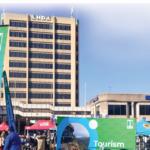Ntsoaki Motaung
The Ministry of Trade and Industry One-stop Business Facilitation Office (OBFC) Director Monaheng Monaheng said Basotho entrepreneurs have only themselves to blame for the influx of foreigners in small scale businesses that should otherwise be occupied by Basotho as they sell their business licences to foreigners.
Monaheng said this in an interview with Newsday this week, saying that locals are not ashamed to go through the application process to attain trading licenses only to lease or sell them to foreigners to operate with them and later return to complain that their businesses are being taken way.
He pointed out that their investigations revealed that foreigners are the ones running the businesses which are on paper owned and run by Basotho.
“They are just cover-ups of what is actually happening because even when the licence is expired, it is the same Mosotho who runs to have it renewed and then take it back to the foreigners.
“This has to come to an end if we really want foreigners out of Basotho’s businesses. Luckily with the new regulations, any person, Mosotho or foreigners who will be found guilty of such illegal practices will be faced with heavy fines that will be imposed on them,†he said indicating that all Basotho should be ready for the changes that will be brought by the implementation of the Business Licensing and Registration Regulations Legal Notice of 2020.
Monaheng said the regulations cannot just be implemented before making sure that all parties involved are ready for the changes and that the Ministry is doing rounds in the country talking to the nation and foreigners in the said business to be prepared for the changes.
“As for Basotho we want to make sure that there are those that are going to take over the businesses,†he said.
“Foreign business people operating under Basotho reserved businesses are not operating illegally as they were given licences to operate before these new regulations. Taking them out of business cannot be done in one day because there are a lot of things to consider such as making sure that their owners are financially ready to take-over the business,†he said.
Monaheng stated that when consultations with stakeholders are complete, there will be a set time for foreigners to be kicked out of such businesses and to partner with Basotho in businesses that allow for such.
In recent weeks Basotho entrepreneurs especially street vendors working in the street of Maseru have been raving about foreigners operating in enterprises that should by law be reserved for Basotho.
According to the Business Licensing and Registration Regulations legal notice of 2020, 34 (1) to (2) “For the purposes of the promotion and development of focal entrepreneurship and micro, small and medium enterprises, the business activities set out in Schedule 16 shall be reserved exclusively for citizens of Lesotho, excluding a naturalised and registered citizen of Lesotho.
It further reads that, “A licence issued to a naturalised of registered citizen of Lesotho, or an enterprise of which the proprietor, shareholder, partner or director is not a citizen of Lesotho shall remain in force until the expiry of the licence.â€
Member of Parliament of the Movement for Economic Change (MEC) TÅ¡epang TÅ¡ita-Mosena on May 5, 2022 asked the Minister of Trade and Industry to apprise the National Assembly on the status of implementation of legislation that reserves certain business for Basotho, the number of foreigners that have been reported operating illegally in business reserved for Basotho since 2020, and measures taken.
The regulations operationalise the Business Licensing and Registration Act of 2019.
Under that act, foreigners who have invested in other businesses falling outside the 47 sectors reserved for locals are required to prove that they have invested at least M2 million in their businesses to renew their traders’ licences. They must also present a corporate social responsibility plan as well as plans or progress in transferring skills and technology to Basotho.
Among the 47 activities reserved for indigenous Basotho are the transport; cleaning; repairing and retail motors sales; growing and selling fruits and vegetables; pharmaceutical wholesaling and retailing; real estate; retail of animal feeds; supply of fuel and retail of hardware.
Summary
- Luckily with the new regulations, any person, Mosotho or foreigners who will be found guilty of such illegal practices will be faced with heavy fines that will be imposed on them,†he said indicating that all Basotho should be ready for the changes that will be brought by the implementation of the Business Licensing and Registration Regulations Legal Notice of 2020.
- Monaheng said the regulations cannot just be implemented before making sure that all parties involved are ready for the changes and that the Ministry is doing rounds in the country talking to the nation and foreigners in the said business to be prepared for the changes.
- Member of Parliament of the Movement for Economic Change (MEC) TÅ¡epang TÅ¡ita-Mosena on May 5, 2022 asked the Minister of Trade and Industry to apprise the National Assembly on the status of implementation of legislation that reserves certain business for Basotho, the number of foreigners that have been reported operating illegally in business reserved for Basotho since 2020, and measures taken.

Your Trusted Source for News and Insights in Lesotho!
At Newsday Media, we are passionate about delivering accurate, timely, and engaging news and multimedia content to our diverse audience. Founded with the vision of revolutionizing the media landscape in Lesotho, we have grown into a leading hybrid media company that blends traditional journalism with innovative digital platforms.








